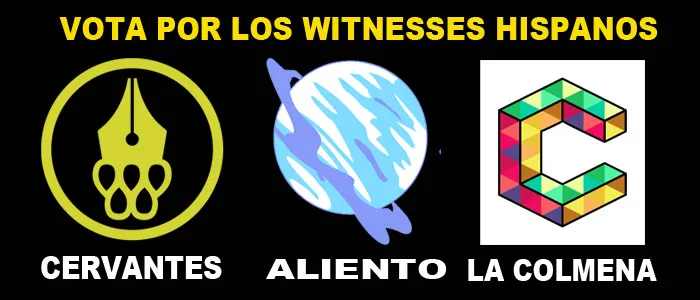
“Nada que sea bueno es gratis”|| "Nothing that's good is free." Jorge Bucay
Español
En este momento estoy leyendo el libro “Cuentos para pensar” de Jorge Bucay, entre otras razones, para participar el 8 de febrero en la actividad propuesta del “Club de Lectura” del podcast Encuentros de Bienestar que desde la comunidad @holos-lotus lleva el amigo @irvinc, valga la presente oportunidad para que entres al link y te unas a esta nutritiva actividad de crecimiento personal.
La referencia al libro viene porque entre sus primeras aportaciones el escritor hace la siguiente afirmación: “Nada que sea bueno es gratis”, desde que leí esa idea no deja de dar vueltas en mi cabeza y al establecer relaciones enseguida me ubico en el emprendimiento y en un razonamiento lineal de causa-efecto podemos concluir que “todo tiene un costo”. Un costo que, como señala el autor, no necesariamente es dinero eso me lleva a plantearme sobre los costos no monetarios que genera el emprender.
English
I am currently reading the book "Cuentos para pensar" by Jorge Bucay, among other reasons, to participate on February 8 in the proposed activity of the "Reading Club" of the podcast Encuentros de Bienestar that from the community @holos-lotus leads the friend @irvinc , it is worth the present opportunity for you to enter the link and join this nourishing activity of personal growth.
The reference to the book comes because among its first contributions the writer makes the following statement: "Nothing that is good is free", since I read that idea does not stop spinning in my head and when establishing relationships I immediately place myself in entrepreneurship and in a linear cause-effect reasoning we can conclude that "everything has a cost". A cost that, as the author points out, is not necessarily money, which leads me to consider the non-monetary costs that entrepreneurship generates.
Los costos no monetarios que genera el emprender
Partiendo del hecho que consideramos que emprender es “algo bueno para nosotros” cuando nos iniciamos, entre el entusiasmo, las expectativas y las actividades propias del quehacer, no nos planteamos o no podemos visualizar algunas consecuencias personales que van ligadas a la trama del emprendimiento y que se transforman en costos porque de muchas manera pagamos esta “necesidad de realización personal” en pequeñas cuotas diarias que van transformando las rutinas de nuestro día a día. Entre los costos que detecto desde mi experiencia se hallan:
1.- La Familia. ¿A cuántas situaciones, que vivimos en familia, dejamos de prestarle la atención que merecen, requieren o necesitan porque estamos metidos de lleno en el emprendimiento? Muchas veces justificamos, no sin razón, que de allí sale el sustento familiar, sin embargo, tener claro que la familia es parte importante de nuestro soporte y apoyo emocional, así como que cada miembro de este núcleo requiere ser atendido (hijo, pareja, padres) debe ser suficiente para redimensionarnos y no dejar que el emprendimiento ahogue esta relación porque, si esto sucede, el costo a pagar es muy alto ¿No te parece?
Busquemos el precio justo y encontremos ese punto de equilibrio donde podamos movernos produciendo el menor impacto posible en la familia, las estrategias para logra esto convergen en un punto: colocarnos límites y estos parten del reconocer el valor que este “bien, tiene para nosotros.
2.- El tiempo. Una de las ideas más vendidas y compradas al emprender es creer que eres dueño de tu tiempo y puedes manejarlo a tu antojo. Es un verdadero mito porque el que ha emprendido sabe que los compromisos van escalando y darle respuesta a las diversas situaciones, a los clientes, a los empleados y a la dinámica propia de sacar adelante el negocio, si te descuidas, absorbe todo tu tiempo, incluso, ese que deber dedicar al descanso.
Aprender a manejar nuestro tiempo es una herramienta indispensable para el emprendedor y este manejo comienza con la organización y la planificación, no hacerlo significa pagar un costo muy alto que se puede traducir en deterioro de la salud, afectación en las relaciones interpersonales, frustraciones personales (porque no hay nada más triste que sentir que no tienes tiempo para más nada) y por supuesto, un costo real en dinero cuando te mides en rendimiento y productividad.
Non-monetary costs of entrepreneurship
Starting from the fact that we consider that entrepreneurship is "something good for us" when we start, among the enthusiasm, the expectations and the activities of the task, we do not consider or we cannot visualize some personal consequences that are linked to the plot of entrepreneurship and that become costs because in many ways we pay this "need for personal fulfillment" in small daily installments that are transforming the routines of our day to day. Among the costs that I detect from my experience are:
1.- The Family: How many situations that we live in family, we fail to pay the attention they deserve, require or need because we are fully involved in the enterprise? Many times we justify, not without reason, that this is where the family support comes from, however, being clear that the family is an important part of our support and emotional support, as well as that each member of this core requires attention (child, partner, parents) should be enough to resize ourselves and not let the venture stifle this relationship because, if this happens, the cost to pay is very high, don't you think?
Let's look for the right price and find that point of balance where we can move producing the least possible impact on the family, the strategies to achieve this converge in one point: to place limits and these are based on recognizing the value that this "good" has for us.
2.- Time. One of the most sold and bought ideas in entrepreneurship is to believe that you are the owner of your time and you can manage it at will. It is a true myth because those who have started a business know that commitments are escalating and responding to the various situations, customers, employees and the dynamics of running the business, if you neglect, absorbs all your time, even that which you should devote to rest.
Learning to manage our time is an indispensable tool for the entrepreneur and this management begins with the organization and planning, not doing so means paying a very high cost that can translate into deterioration of health, affectation in interpersonal relationships, personal frustrations (because there is nothing sadder than feeling that you do not have time for anything else) and of course, a real cost in money when you measure yourself in performance and productivity.

3.- Los excesos. Dice la conseja popular que “todo en exceso es dañino” y mucho de cierto hay en ello, el exceso de trabajo, de compromisos y responsabilidades que asumimos a través de desarrollo de nuestro emprendimiento puede hacernos colapsar en muchos sentidos: como ya referíamos en la salud entrando en situaciones de estrés, ansiedad, bajones de ánimo, mala alimentación, restarle tiempo al descanso, en fin los costos, en este sentido también pueden llegar a ser muy elevados.
Adicional a ello es probable que una mente saturada ralentice los procesos creativos y nos lleve a cierto nivel de apatía pagando el costo de entrar en emociones negativas que debilitan nuestra percepción de motivaciones y logros.
4.- El costo emocional. Aunque he tocado este aspecto en los puntos anteriores quisiera puntualizar algunos detalles. Al emprender sabemos que estamos entrando en un mundo donde las certezas no existen, que cualquier cosa puede pasar y cambiar las circunstancias y condiciones de un momento para otro, de allí que se haga tanto hincapié en que el emprendedor debe desarrollar las fortalezas de carácter y contar con un Equipaje emocional que lo sostenga cuando el viento no sople a su favor.
El miedo, la frustración, el querer tener el control de todo, la culpa detrás del error, son sentimientos que pueden aflorar en un momento dado, es un costo posible que habrá que pagar si se presenta, tener herramientas para afrontarlo es la manera de minimizar su impacto.
3.- Excesses. The popular saying goes that "everything in excess is harmful" and there is a lot of truth in it, the excess of work, commitments and responsibilities that we assume through the development of our enterprise can make us collapse in many ways: as we already mentioned in health entering into situations of stress, anxiety, mood swings, poor diet, subtract time to rest, in short, the costs in this sense can also become very high.
In addition, it is likely that a saturated mind slows down the creative processes and leads to a certain level of apathy, paying the cost of entering into negative emotions that weaken our perception of motivations and achievements.
4.- The emotional cost. Although I have touched on this aspect in the previous points, I would like to point out some details. In entrepreneurship we know that we are entering a world where certainties do not exist, that anything can happen and circumstances and conditions can change from one moment to the next, that is why so much emphasis is placed on the fact that the entrepreneur must develop character strengths and have an Emotional baggage to support him/her when the wind is not blowing in his/her favor.
Fear, frustration, wanting to be in control of everything, the guilt behind the mistake, are feelings that may arise at any given moment, it is a possible cost that will have to be paid if it occurs, having tools to deal with it is the way to minimize its impact.


Definitivamente, Bucay tiene razón: “Nada que sea bueno es gratis”, en esta misma frase, mirándola desde otra perspectiva encontramos un gran motivador: lo que es bueno. La acción de emprender, para el que lo hace es algo bueno, en ella se encuentran nuestras pasiones, deseos, desde el emprendimiento miramos nuestro presente y futuro y si es verdad que se encuentra lleno de incertidumbres al mismo tiempo nosotros nos encargamos de convertirlos en retos, en propósitos y objetivos que nos mueven y le dan vitalidad a cada nuevo día.
¿Qué tiene un costo? Todo tiene un costo, es cuestión de “saber administrar” porque aquello que nos lleva a la “autorrealización” bien vale dedicarle nuestro esfuerzo e intención.
Definitely, Bucay is right: "Nothing that is good is free", in this same phrase, looking at it from another perspective we find a great motivator: what is good. The action of undertaking, for the one who does it is something good, in it are our passions, desires, from entrepreneurship we look at our present and future and if it is true that it is full of uncertainties at the same time we take care of turning them into challenges, purposes and objectives that move us and give vitality to each new day.
What has a cost? Everything has a cost, it is a matter of "knowing how to manage" because that which leads us to "self-realization" is well worth our effort and intention.


 @zupasteleria
@zupasteleria  @tayiitos
@tayiitos

Translated with www.DeepL.com/Translator (free version)
Fuente de imágenes: Portada - 1 - 2



MIS REDES SOCIALES





Entra y Vota
@la-colmena: https://vote.hive.uno/@la-colmena
@aliento: https://vote.hive.uno/@aliento
@cervantes: https://peakd.com/me/witnesses


Be Entrepreneur



